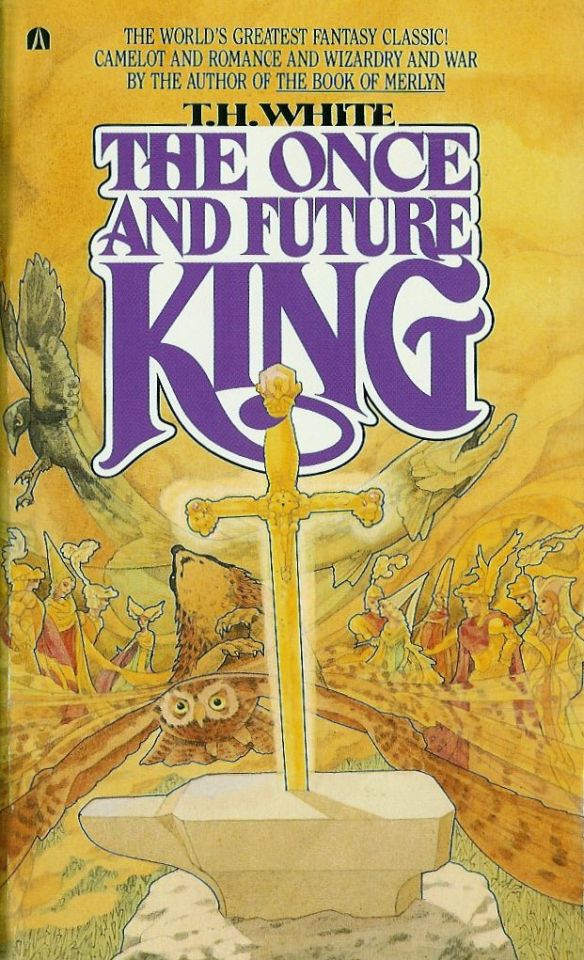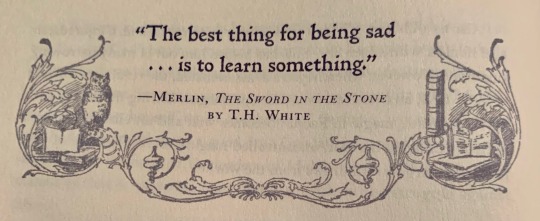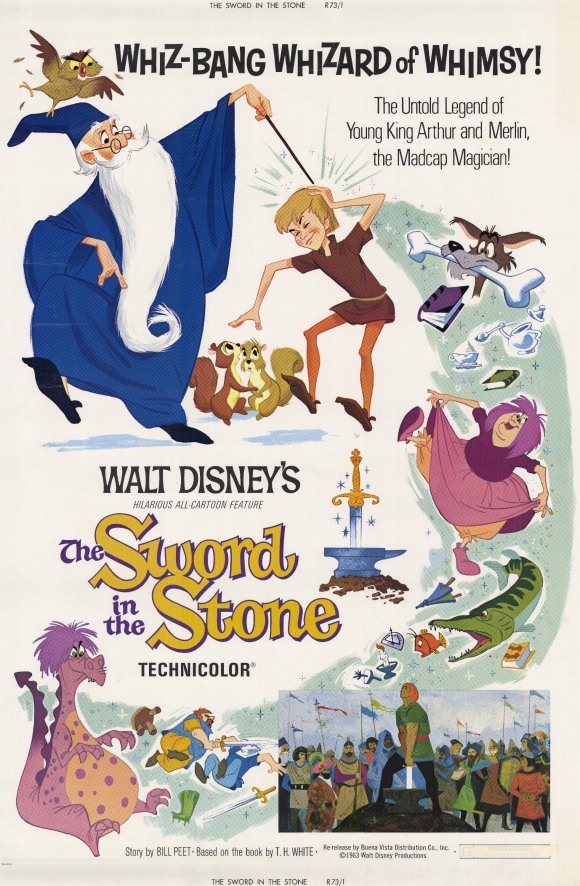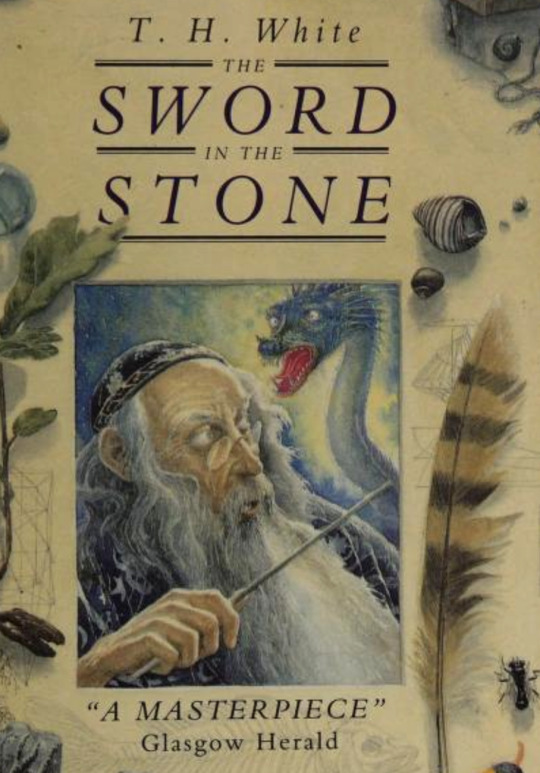#T.H. White
Text

93 notes
·
View notes
Text
Morgause' Innocence
I once said in the tags of one of my reblogs that Morgause needs to be blameless in the conception of Mordred because of Lancelot and I felt I need to clarify:
Morgause must be fundamentally innocent any wrongdoing regarding the incest with her brother, so that Arthur alone is responsible for Mordred's existence - The Fall of Camelot must be Arthur's responsibility in some capacity.
This is because one of Arthur's fundamental pillars of his narrative: King Arthur is a divinely chosen ruler. The whole of point of "the Sword of the Stone" is to physically prove to both the in-story characters, and to the Medieval readers, that Arthur has the backing of God himself. Therefore, for narrative purposes, Arthur's sovereignty and properity as a ruler is because of God's Favor and anything bad that happens to Arthur and his Kingdom, has to have some measure of "Arthur must have broken his relationship with God somehow" (This is why during the Galehaut War arc, where Arthur is losing, he consults with a wise man to confess his sins, in order to reestablish his rapport and standing with God)
The problem that arises with Lancelot's inclusion into "the Fall Narrative" - that is, the collapse of Arthur's reign - is that the "Exposure of Lancelot and Guinevere's Affair" negates and replaces the Conquest arc, where Arthur engages in the moral grey zone of conquering all of Europe, thus at least providing at least a passable rationale for why Arthur lost favor with God.
With "the Affair Narrative", Arthur is innocent overall and totally in the right to defeat Lancelot and win. With all the bias and favoritism Lancelot gets from the French writers, having Lancelot lose would not only be humiliating but also defeats the whole purpose this version of The Fall was written in the first place - the real reason Lancelot is even part of this story: to enshrine him as an unquestionable element of Arthurian history.
So, what did the French Writers do? Simple: they retcon Mordred from nephew to a bastard born of incest (perhaps inspired by certain Charlemagne stories, where Roland is secretly his bastard son).
This is their out, their clever little plot device: having Arthur commit such an abominable act - even if unwittingly - removes whatever favorable ties he has to God, and thus, Arthur has his kingdom collapse from right under him while he's fighting Lancelot.
Which ultimately brings us back to Morgause. Making Morgause evil defeats the whole point why incest!Mordred was introduced in the first place. Evil!Morgause absolves Arthur of wrongdoing.
And if Arthur's squeaky clean, then he can't Fall and God would prevent any negative narrative consequences from occuring to Arthur.
Lancelot would lose (hah!), Camelot/Logres would be perfectly fine and Arthur would move on with his life.
This is why Tennyson's and T.H. White's narratives never made sense to me: Why is Arthur being punished for the actions of others? It makes God look incompetent in punishing those actually responsible and the Sword in the Stone/Excalibur of the Lake end up looking like pointless gestures.
(It's worse in Tennyson's because he's trying to portray Arthur as a semidivine figure unrelated to Uther) (Ughh)
Their stories feel like they ignore God as an active force in Arthur's royal life and in the lives of others. *Points to the Post-Vulgates' version of the Mayday Massacre, where God protects all the infants - They SURVIVED, unlike Malory's*
#my thoughts#off my chest#reblogs#arthuriana#king arthur#sir mordred#morgause#sir lancelot#t.h. white#alfred tennyson#once and future king#idylls of the king
30 notes
·
View notes
Text

I mean, the black-and-white stuff was running backward, but it hardly mattered to the story.
Merlin [Explained]
Transcript Under the Cut
[Cueball and Megan standing by a train on a platform.]
Megan: I'm bad at goodbyes. At some level I never think they're for real.
Cueball: They make me think of T. H. White's Merlin.
[They are still standing at the edge of the platform, but the train is no longer in the frame.]
Megan: Oh?
Cueball: He lived backwards, remembering the future and not the past. To him, final goodbyes meant nothing, while first hellos were tearful and bittersweet.
[Zooming out, the rail closest to the platform becomes visible.]
Megan: Huh - so over the years he'd forget all his friends.
Megan: Must've been lonely.
Cueball: Yeah. He ended up just sitting around at home watching DVDs all day. The best was the time he rented 'Memento'...
[Merlin with pointy hat and long white beard is sitting in a couch with the remote, watching TV which emits light and is clearly hooked up to a device (a DVD player).]
Merlin: Well, that was straightforward.
22 notes
·
View notes
Quote
It is the mother's not the lover's lust that rots the mind. It is that which condemns the tragic character to his walking death. It is Jocasta, not Juliet, who dwells in the inner chamber. It is is Gertrude, not the silly Ophelia, who sends Hamlet to his madness. The heart of tragedy does not lie in stealing or taking away. Any feather-pated girl can steal a heart. It lies in giving, in putting on, in adding, in smothering without the pillows. Desdemona robbed of life or honour is nothing to a Mordred, robbed of himself--his soul stolen, overlaid, wizened, while the mother-character lives in triumph, superfluously and with stifling love endowed on him, seemingly innocent of ill-intention. Mordred was the only son of Orkney who never married. He, while his brothers fled to England, was the one who stayed alone with her for twenty years--her living larder. Now that she was dead, he had become her grave. She existed in him like the vampire.
T.H. White, The Candle in the Wind
190 notes
·
View notes
Text

31 notes
·
View notes
Text
“He watched out at the stars in a kind of trance. Soon it would be the summer again, when he could sleep on the battlements and watch these stars hovering as close as moths above his face—and, in the Milky Way at least, with something of the mothy pollen. They would be at the same time so distant that unutterable thoughts of space and eternity would baffle themselves in his sighing breast, and he would imagine to himself how he was falling upward higher and higher among them, never reaching, never ending, leaving and losing everything in the tranquil speed of space.”
— The Once and Future King
15 notes
·
View notes
Text
The Sword in the Stone (1963)

The Sword in the Stone by T. H. White (1938)

3 notes
·
View notes
Text
As far as the Wart was concerned, there was a time after this in which Sir Ector kept telling him to put the sword back into the stone—which he did—and in which Sir Ector and Kay then vainly tried to take it out. The Wart took it out for them, and stuck it back again once or twice. After this, there was another time which was more painful.
He saw that his dear guardian was looking quite old and powerless, and that he was kneeling down with difficulty on a gouty knee.
“Sir,” said Sir Ector, without looking up, although he was speaking to his own boy.
“Please do not do this, father,” said the Wart, kneeling down also. “Let me help you up, Sir Ector, because you are making me unhappy.”
“Nay, nay, my lord,” said Sir Ector, with some very feeble old tears. “I was never your father nor of your blood, but I wote well ye are of an higher blood than I wend ye were.”
“Plenty of people have told me you are not my father,” said the Wart, “but it does not matter a bit.”
“Sir," said Sir Ector humbly, “will ye be my good and gracious lord when ye are King?”
“Don’t!” said the Wart.
“Sir,” said Sir Ector, “I will ask no more of you but that you will make my son, your foster-brother, Sir Kay, seneschal of all your lands?”
Kay was kneeling down too, and it was more than the Wart could bear.
“Oh, do stop,” he cried. “Of course he can be seneschal, if I have got to be this King, and, oh, father, don’t kneel down like that, because it breaks my heart. Please get up, Sir Ector, and don't make everything so horrible. Oh, dear, oh, dear, I wish I had never seen that filthy sword at all.”
And the Wart also burst into tears.
The Sword In The Stone, T.H. White
#happy new year/sword in the stone day!!!#this passage makes me want to fall on a sword myself!!!#arthuriana#t.h. white#the once and future king#the sword in the stone#;all the tales that you remember of camelot.#;i am unbodied by thy books.#;t.h. white.#;the once and future king.
33 notes
·
View notes
Text
The bravest people are the ones who don’t mind looking like cowards.
T.H. White, The Once and Future King
3 notes
·
View notes
Text
Agora, em seu amor, que era mais forte, havia sementes de ódio e medo e confusão, que cresciam simultaneamente: pois o amor pode existir com o ódio, cada um à espreita do outro, e é isso que o torna tão furioso.
- O único e Eterno Rei, T.H. White
#livros#tirei de um livro#minha leitura#amante de livros#frase de livro#literatura#li em um livro#frases de livros#frases#trechos de livros#o único e eterno rei#t.h. white#a escola do bem e do mal#soman chainani
15 notes
·
View notes
Quote
Chaucer, Spenser, Shakespeare, Milton, Wordsworth, Tennyson and a number of other reliable witnesses agree that [King Arthur] is still on earth.
The Book of Merlyn by T.H. White (1941)
34 notes
·
View notes
Text
"You must remember I am the King of England. When you are a king you can’t go executing people as the fancy takes you. A king is the head of his people, and he must stand as an example to them, and do as they wish." He forgave the startled expression in Lancelot’s face, and took his hand once more. "You will find," he explained, "that when the kings are bullies who believe in force, the people are bullies too. If I don’t stand for law, I won’t have law among my people. And naturally I want my people to have the new law, because then they are more prosperous, and I am more prosperous in consequence." They watched him, wondering what he meant to convey. He held the look, trying to speak with their eyes. "You see, Lance, I have to be absolutely just. I can’t afford to have any more things like those babies on my conscience. The only way I can keep clear of force is by justice. Far from being willing to execute his enemies, a real king must be willing to execute his friends."
T.H. White, chapter 4 of "The Candle in the Wind", part 4 of The Once and Future King
49 notes
·
View notes
Text

15 notes
·
View notes
Text
"All women, indeed, are sisters under The Goddess."
-Morgaine, from The Mists of Avalon, by Marion Zimmer Bradley
#marion zimmer bradley#the mists of avalon#arthurian legend#the goddess#morgaine#The Once and Future King#T.H. White
5 notes
·
View notes
Quote
In the secret parts of his peculiar brain, those unhappy and inextricable tangles which he felt at the roots, the boy was disabled by something which we cannot explain. He could not have explained either, and for us it is all too long ago. He loved Arthur and he loved Guenever and he hated himself. The best knight of the world: everybody envied the self-esteem which must surely be his. But Lancelot never believed he was good or nice. Under the grotesque, magnificent shell with a face like Quasimodo's, there was shame and self-loathing which had been planted there when he was tiny, by something which it is now too late to trace. It is so fatally easy to make young children believe that they are horrible.
T.H. White, The Ill-Made Knight
99 notes
·
View notes
Text
«"If I were to be made a knight," said the Wart, staring dreamily into the fire, "I should insist on doing my vigil by myself, as Hob does with his hawks, and I should pray to God to let me encounter all the evil in the world in my own person, so that if I conquered there would be none left, and, if I were defeated, I would be the one to suffer for it."
"That would be extremely presumptuous of you," said Merlyn, "and you would be conquered, and you would suffer for it."
"I shouldn't mind."
"Wouldn't you? Wait till it happens and see."»
— The Once and Future King
7 notes
·
View notes